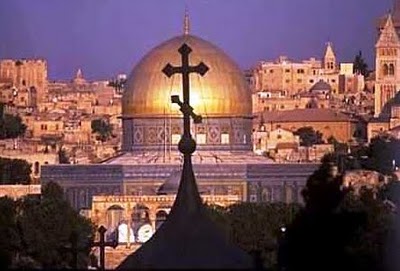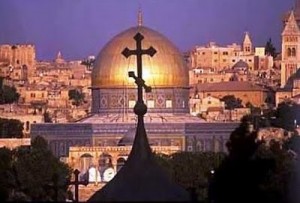Middle Eastern Christians and the Arab Spring – by Duncan Hanson
Mohammed said that, of all religious people, Christians are closest in affection to Muslims. Even so, ever since Mohammad conquered the city of Mecca in 630 AD, it has often been difficult to be a Christian in the Middle East.
The problem is not that intolerance against Christians is hardwired into Muslim theology; most Muslim theologians say that, in fact, it isn’t. The problem for Christians in the Middle East is that over the last fourteen centuries they have been repeatedly identified with a long list of unwelcome meddlers. That list starts with the Byzantines, continues with the Crusaders, proceeds a few centuries later to British and French colonialists and, since the Blackstone Memorial of 1891, to conservative American and other Western Christian preachers who have advocated Jewish settlement of the ancient land of Palestine. Over the last 30 years or so, that list of foreign meddlers has been lengthened by the “soft” imperialism of Hollywood film studios, Aramco and BP, McDonalds, Pizza Hurt and Starbucks, CNN, Google, Facebook, Twitter and, above all, the omnipresent and seemingly omnipotent English language. The United States and NATO interventions in Iraq and Libya are only the latest entries on that list.
Burdened by such associations, Middle Eastern Christians have been sometimes viewed with suspicion by their Muslim compatriots. Of course, that suspicion has also been reciprocated by some Christians, particularly in regard to more ‘radical’ Muslims. Paradoxically, the dictatorships that emerged in many countries in the Muslim Middle East following the end of colonial rule gave Christians shelter from many of the negative effects of that suspicion. The dictators knew that if they tolerated too much overt persecution of Christians they would face criticism on the world stage as well as possible sanctions by European nations and the United States. Since most of the dictators were basically indifferent to religious questions, it made it easy for them to take a more pragmatic and therefore, from the Christians’ perspective, a more tolerant approach to religious diversity in their respective countries.
Then came the Arab Spring. A street vendor in Tunis decided he had finally had enough and set himself on fire on December 18, 2010. His self-immolation set off a revolution in Tunisia, which in turn set off other revolutions in Egypt and Libya as well as ongoing civil strife in Syria and Yemen. There have also been major or less major protests in Bahrain, Jordan, Morocco, Algeria and Western Sahara. Though the circumstances in every country are unique, in each of those countries both Christians and Muslims knew they were living under a dictatorship of one kind or another. They knew that Christians who dared speak out against their dictators faced the same repressive measures as did Muslims. But Christians, in at least some of these countries, also knew that their dictators would try to protect their religious freedom as long as they limited their practice of their faith to the confines of their own communities.
It is, therefore, no wonder that many Christians responded to the Arab spring with ambivalence. In some countries senior Christian leaders spoke out against the “democracy protests” at the same time that others, especially members of the parish clergy, joined street protests against their dictatorships. In some countries Christians found themselves coerced by dictatorships with which they had once had friendly relations to take part in photo-ops intended to give the misleading impression that all was still normal. But as in country after country the old dictatorships toppled or fell, Christians often found themselves at a loss in knowing how best to respond to the Arab Spring.
How do Middle Eastern Christians see their future? Surprisingly, their first concern is the same as it was before the Arab Spring, namely the loss of their young people to emigration to Europe, Canada, and the United States. Everywhere in the Middle East, Christian communities are smaller today than they were a decade ago. In some places, the very survival of the Christian community is threatened by the loss of their young people to a more secure and sometimes better life in the West. Of course, Middle Eastern Christians understand why their sons and daughters and grandchildren now live in Frankfort and Stockholm and Detroit, but they mourn the loss of the promise and hope those young people carried with them. The Christian community will continue to decline as a result of mass migration to the West until there is enough stability that there is no longer a motivation to move to the West.
The second concern that Middle East Christians have following the changes of the Arab Spring Middle East is the hostility they feel from some in the Muslim community. Many Middle Eastern Christians believe they would have no problems with Muslims if it were not for the Muslims’ somewhat justified impression that the West is seeking to impose a new postcolonial hegemony in their part of the world. A number of Middle Eastern Christians are saying that the more independent their new governments can stay from Western influence, the less animosity they will experience.
At this point, nine months after the beginning of the Arab Spring, some Middle Eastern Christians do have a sense that things are getting better. However, as long as the Middle East is roiled by conflict and as long as far too many resources are diverted to support the lavish lifestyles of elites and as long as Middle East countries believe they must maintain large militaries to deter aggression from Israel and perhaps Iran, many Middle Easterners, including some Middle Eastern Christians as well as some ‘moderate’ Muslims, will not believe their region has a collective future.
What is the take home message for North American Christians? We need to have patience for the seemingly contradictory messages we might think we are getting from Middle Eastern Christians. Moreover, we must not allow our politicians or pundits to get away with claiming that Christians in the Middle East all think one thing and that they, our politicians and pundits, know what that is. Finally, perhaps American Christians need to reconsider aspects of United States’ foreign policy that might be harmful to peace in the Middle East.



Unfortunately, Middle Eastern Christians are proxies of the West and its colonial and imperialist record. So we are “at home” neither here nor there… But I have to add that Islamic Fundamentalism was a minor force before the 1967 War when Israel occupied the West Bank, etc. After that war, support for the idea that we have entered the End Times by Christian Fundamentalists has had something to do with the rise of Islamist groups… These things are not unrelated.
Thank you Duncan, for your insights into the “Arab Spring”, its various manifestations and possible consequences for countries and people there, and for possible changes in US policies in the ME. (I for one, had to look up Blackstone Memorial of 1891 on Google to learn of this dispensaional influence already being exerted on our highest elected officials. Thank you for that).
You mention “stability”, an interesting word with multiple meanings. It often connotes Western “control”. The Obama administration has scrambled to be seen on the correct side of the popular uprisings against “our” dictators. Truly embarrassing.
It remains to be seen what the outcomes will be. The stifling and unleashing of human dignity are an ongoing issue in all places. Thank you for your attention to it.
Thank you, Duncan, for a helpful take home message that we can share in our churches. Younan Shiba will be visiting our congregation on Wednesday and I know your word will resonate well with him given his experience in Iraq. Blessings for good health and vital ministry!
Pingback: The “Arab Spring” and the Church – by Cynthia Holder Rich and Mark Rich | Ecclesio.com